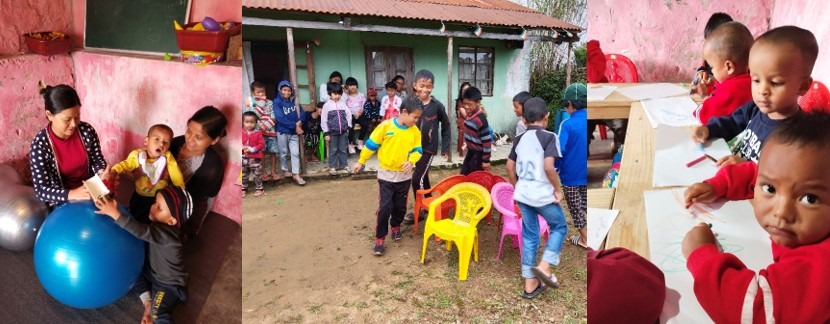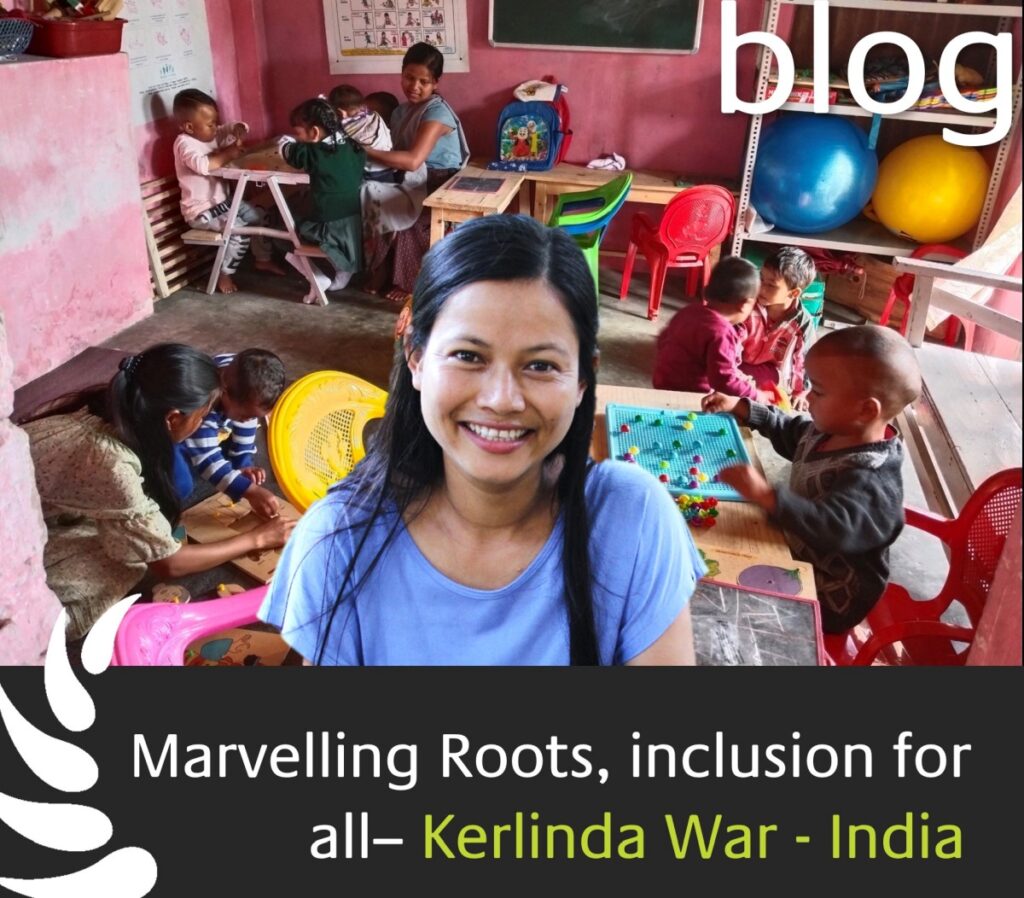Summary
Being bullied and marginalized in her childhood, while working as a hostel warden at Bethany Society, Kerlinda could relate to the experiences of children with disabilities. After a specialized course in rehabilitation therapy she found her purpose in life. Kerlinda found joy and satisfaction in her years of work in rehabilitation for children with slow growth and physical impairment. Her organisation Marvelling roots in Meghalaya, India provides training on early identification, early intervention of children with cerebral palsy, referral services, and prepares children for schooling and socialization.
by Kerlinda War
“Monkey! Monkey!” Little children and some adults would scream as I walked by, bursting into laughter. This got on my nerves. it wasn’t a compliment; it only demoralized my spirits. Completely rejected and bullied by my friends and even my siblings, I became a black sheep. Not having anyone to play with, I spent a lot of time in nature, foraging for berries and edible leaves, and climbing trees. The latter of which gave me the infamous nickname.
I’m Kerlinda, from Meghalaya – Northeast India. In 2012, I joined Bethany Society as a hostel warden for children with disabilities, my first formal job after my graduation in social work. Here I got an opportunity to interact with them and learn about their experiences and the challenges they faced before joining Bethany Society. Hearing their stories about how they had overcome their problems made me reflect on my childhood.
I’m from the Khasi tribe. We follow matrilineal lineage where the children take the mother’s surname, and the inheritance usually goes to the last daughter. Women and men get equal treatment; it is only at the community level that women cannot be the head of a village.
Meghalaya is a mountainous area, with beautiful landscapes and pleasant weather. The two villages of Sohra and Mawsynram hold the record for being the rainiest on earth. Besides all these attractions, the place has some drawbacks. A major problem is alcoholism, which has become a threat to society. The consequences of this are family breakage, single parents, and poverty.
My father was an alcoholic and due to this, we faced domestic violence at home. Coming from an unstable family, made me prone to abuse and rejection. I faced bullying in school and rejection by my peers. In school, some girls once locked me in a toilet, humiliated and laughed at me. The feeling was terrible, trying to fit in but always facing rejection. At the age of seven, my mother decided to leave my father, we moved to our village in Sohsarat and I continued my primary schooling. Local children would imitate a monkey whenever they saw me. Sometimes I felt like I was not human but a helpless adopted animal.
Failure was heavy on my shoulders because of low grades but my mother’s support and understanding kept me encouraged to continue with my studies. After completing secondary education, I joined a bachelor’s degree course in social work at a local university in Shillong. During my studies, I developed an understanding of working with underprivileged people. Later I joined Bethany Society after graduation where I found my purpose and a strong ambition to cater to children with disabilities. It became my calling. I went on to finish a specialized course in rehabilitation therapy and after receiving the certificate I was retained as a training coordinator for community-based rehabilitation. Through my experiences of working with these children, I was moved to establish a similar cause with unique approaches in Sohra. I believe with this effort there will be a change in the whole region and children with disability will get equal opportunities like other children without discrimination.
After returning from kanthari in 2018. I was lucky enough to be sponsored for a year by my mother and given office space by a former teacher. I was able to conduct a pilot project by starting a small early childhood intervention centre with 3 kids in attendance. One of them, John who suffers both from Cerebral Palsy and intellectual disability, was provided with physical therapy, and vocabulary training (he was non-verbal). Though he is still hyperactive, John can have simple conversations, follow instructions, and is partially independent. Another child, Pynskhem, who has an intellectual disability, was out of school when he started. Shy, and unsocialized, it was difficult for him to be integrated with the other children. But now, he is attending a mainstream school, mingling with other children, communicating better, and has adapted to the school environment.
Additionally, I was able to visit 10 surrounding distant villages. I met with village heads and explored the problem further. What became clear is that adults with disability, both intellectual and otherwise didn’t have basic amenities such as a disability certificate and access to government schemes). There are 300 disabled persons in my constituency, and so far, we have been able to reach out to 60 in collaboration with the state resource centre to guide them in getting access to welfare.

Nowadays, there is an inclusive Early childhood inclusive center (ECI), in a space provided at minimal cost, thanks to Lambor, a benefactor from a neighbouring village. We currently have 25 Children: 5 with disability and the rest without. The children without disabilities don’t see disability as a barrier at all and are very accepting of their peers. 4-year-old Lamang, who has a growth deficiency is always the life of the party.
Apart from the centre, 15 children with disability above 6 years old are being visited at home to deliver tailor-made interventions.
There is still a long way to go. Many parents of disabled children are concerned about the future of their children, and that is something to address on the horizon of Marvelling Roots.
But a few success stories in this regard give us hope. 21-year-old Shirley*, a blind woman from our area was totally dependent on her family and did not step out in public. She would not even face visitors to her home. After our daily intervention, she is slowly learning not to put herself down because of her blindness. She is also learning to speak English. Her father was constantly being overprotective, but he is coming around now as he sees his daughter become more mobile and confident. He now encourages her a lot. She wants to come out into the world and try her hand at road construction work, just to see if she can do it. Recently she attended her first house party, the relatives who had gathered had never met her before.
She has built up the courage but has a long way to go.
Her goal right now? To go to the market which is 1 km away through a busy road… on her own.
*Name changed



